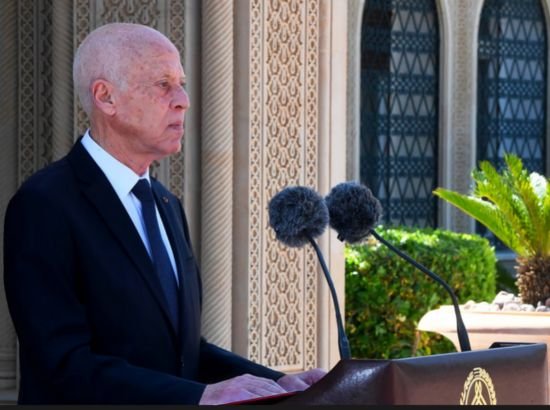
A Tunisian court has issued lengthy prison terms ranging from 13 to 66 years in a sweeping mass trial of political opponents, lawyers, and business leaders — a move that critics say is part of President Kais Saied’s escalating crackdown on dissent.
On Saturday, businessman Kamel Ltaif received the harshest sentence of 66 years, while opposition leader Khayam Turki was sentenced to 48 years, according to defence lawyers.
Other prominent figures — including Ghazi Chaouachi, Issam Chebbi, Jawahar Ben Mbarek, and Ridha Belhaj — were each given 18-year sentences. All have been detained since 2023.
The case, which began in March 2025, involves over 40 defendants, though more than 20 individuals have already fled the country to avoid prosecution.
Authorities claim the accused — which include former security officials and intelligence chief Kamel Guizani — were plotting to destabilise the nation and oust President Saied.
However, opposition leaders argue the case is politically motivated. Speaking ahead of the ruling, defence lawyer Ahmed Souab denounced the proceedings:
“I have never witnessed a trial like this. It’s a farce. The rulings are prewritten — this is scandalous and shameful.”
Since dissolving Tunisia’s parliament in 2021 and assuming rule by decree, President Kais Saied has tightened control over the country’s institutions. He disbanded the Supreme Judicial Council and removed dozens of judges in 2022 — drawing concern from international rights groups.
Saied was re-elected in 2024 with over 90% of the vote, but opposition groups and analysts say the political landscape has become increasingly repressive.
“These unjust and vengeful verdicts are aimed at silencing dissent,” said Youssef Chaouachi, son of Ghazi Chaouachi, after the court’s decision.
Speaking on Friday, Nejib Chebbi, leader of the National Salvation Front, accused the regime of “criminalising the opposition.” Chebbi, who was also named among the defendants, has been a vocal critic of Saied’s consolidation of power.
President Saied has repeatedly described his critics as “traitors and terrorists,” insisting in 2023 that any judge who acquitted them would be complicit in subversion.
Opposition figures argue the case is part of a broader effort to neutralise all political opposition and cement a one-man authoritarian regime. They also allege that the defendants were working on a unified platform to resist Tunisia’s democratic regression — a cause they claim has now been crushed.
Most major political party leaders in Tunisia are now behind bars, including:
Abir Moussi, head of the Free Constitutional Party
Rached Ghannouchi, long-time leader of the Ennahda movement
Tunisia — once hailed as the birthplace of the Arab Spring and a model for democratic transition — now appears increasingly isolated as critics warn of a full-scale authoritarian reversal under Saied.